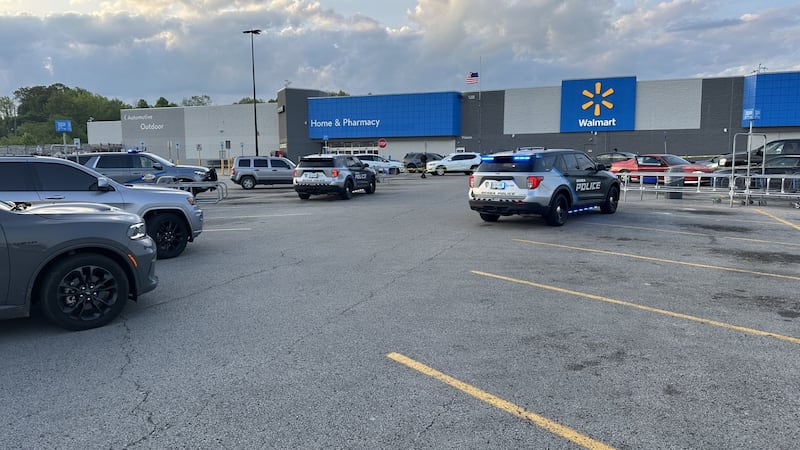How one Kentucky K9 is sniffing out online danger to protect kids
BOWLING GREEN, Ky. (WBKO) – Police dogs are known for their ability to sniff out drugs, explosives and even missing persons. But one K9 partner with the Kentucky State Police has a completely different skill.
Who is K9 Cam and what does he do?
Based in Graves County, K9 Cam, an English Labrador Retriever, is specially trained to detect hidden electronic devices used by online predators, playing a vital role in safeguarding children from digital threats—one sniff at a time.
“He really helps us because it gets us to think outside the box in a lot of ways. There have been places where he’s located stuff that in a million years we wouldn’t think something would be hidden there,” said Cam’s handler, Detective John Sims.
Born on October 6, 2020, Cam was training to be a service dog, but after not meeting the requirements, he was sent for specialized police training in Indianapolis.

Cam is trained to alert when he detects triphenylphosphine oxide, a chemical compound often used in electronics. TPPO is commonly found in certain electronic components and serves as a stabilizer, preventing overheating and degradation of materials.
With his nose to the ground, Cam is instructed to “seek” by Detective Sims. When he’s found a device, he motions with his nose toward it and sits down, hoping for a bite to eat.
“He’s a food reward K9, so he’s not like your typical police K9,” Sims said. “Most of your police K9s, especially your patrol dogs or bomb K9s, are toy rewards. He gets fed when he locates a device.”
Cam’s not a “probable cause K9,” so he only responds when police obtain a search warrant or get consent to search. He is one of five K9s in Kentucky specially trained for electronic crime work.
He was donated to the Kentucky State Police by OUR Rescue, a nonprofit organization dedicated to ending sex trafficking and child exploitation worldwide.
Outside of work, Cam enjoys leisurely walks, and playing with frisbees, tennis balls, and his stuffed animals. Since he joined KSP in 2022, he has won awards for his skills and accomplishments.
What are police seeing as the most significant threats?
Now in his 24th year of law enforcement, Detective Sims has witnessed firsthand the dramatic shift in how technology is used—both for good and for harm.
After rising through the ranks of the Kentucky State Police, he joined the Electronic Crimes Branch in 2017 as a detective, around the time the branch regionalized.
Since then, cases have continued to evolve, and unfortunately, become more prevalent.
“Kids, at a younger age, are getting devices in their hands that can access gaming platforms and mobile applications,” Sims said.
After KSP regionalized its ECB, detectives across the state were able to respond faster to growing threats in communities across the Commonwealth.
Detective Sims said cases of “sextortion” are on the rise, with predators grooming children and teens into sending explicit images—then using those images to blackmail victims for money.
“There’s nothing wrong with technology itself,” Sims said. “It’s what people tend to do with the technology that’s the issue.”
Artificial intelligence is also posing complications to investigations.
“With AI, it’s getting to the point where it’s hard to discern what is real and what is not real,” Sims said.

What is the KSP Electronic Crime Branch?
Technology is woven into every part of our lives—from smartphones and laptops to smartwatches, gaming consoles, and even the small USB drives we often overlook.
But when these devices fall into the wrong hands, they can become hiding spots for dangerous digital evidence. That’s where the Kentucky State Police Electronic Crime Branch steps in, working to uncover hidden tech that could take down online predators and protect children from harm.
The Electronic Crime Branch was formed in 1999 and serves as Kentucky’s regional task force for Internet Crimes Against Children.
Across the country, 61 regional task forces form a national network, investigating and responding to internet crimes against children. In Kentucky, 36 agencies work alongside the KSP ECB.
How do authorities investigate internet crimes?
Under federal law, electronic service providers must report any suspected child sexual abuse material found on their platforms to the National Center for Missing & Exploited Children.
In 2023, NCMEC received over 36.2 million reports of suspected child exploitation, up from 31.9 million in 2022 and 23.9 million reports in 2021.
After processing these reports, NCMEC forwards them to the appropriate law enforcement agencies for further investigation.
As Kentucky’s Internet Crimes Against Children task force leads the Kentucky State Police receives all NCMEC reports statewide. From there, KSP either investigates the case directly or assigns it to one of its partner agencies across the Commonwealth.
Locally, the Bowling Green Police Department, Warren County Sheriff’s Office, and Scottsville Police Department are among the agencies participating in the regional ICAC network.
Last month alone, KSP received 1,136 cyber tips, Detective Sims said. The top two platforms where those tips originated are Instagram and Snapchat.
“There’s information on who the possible victim is. There’s information on who the possible suspect is,” Sims said. “Many times it’s just a username or an email associated with that account in question.”
Once probable cause is established, investigators can issue subpoenas for additional information from service providers or request a search warrant to access devices or accounts.

But these investigations are rarely straightforward—and they’re becoming increasingly complex.
“Many times these bad actors—these predators—end up being overseas, whether it be on the Ivory Coast or Nigeria," Sims said. “That’s where we really rely on our federal partners to get involved.”
Even when authorities identify users on various platforms, differences in legal requirements can complicate investigations.
For instance, while companies like Meta (which owns Facebook and Instagram) are based in the U.S. and must comply with federal reporting laws, platforms headquartered outside the U.S. are a different story.
“We run into this issue that some of these applications aren’t really reporting NCMEC because they’re not bound by U.S. federal code to report that,” Sims said.
What can you do to help fight against these crimes?
Online dangers pose a risk to any of us, but children and teens often fall victim to schemes. Because of that, Detective Sims said parents and guardians should pay attention to how their children are using technology.
“You have to be involved with your kids at an early age,” Sims said.
The SMART resource is an easy acronym to remember what you should do before allowing your child to have online freedom.
- Set-up: Devices/ Accounts/ Passwords
- Monitor: Online Use/ Connections
- Approve: Apps/ Games
- Restrict: Content/ Permissions
- Talk: #StartTheConversation/ Teach
Online dangers don’t just happen on social media. They extend to places you might not even think like gaming platforms. Check out ESRB for game ratings and Common Sense Media for ratings and reviews.
“You wouldn’t go talk to some random person in person, you wouldn’t get in the car with someone you don’t know,” Sims said. “It’s the same concept online.”
If explicit images are posted online, NCMEC provides the Take It Down service, a free tool that allows individuals to request the removal of explicit content featuring minors from various websites.
Detective Sims’ one piece of advice—keep the message simple.
For other resources, visit Prevent Child Abuse Kentucky.
Copyright 2025 WBKO. All rights reserved.















